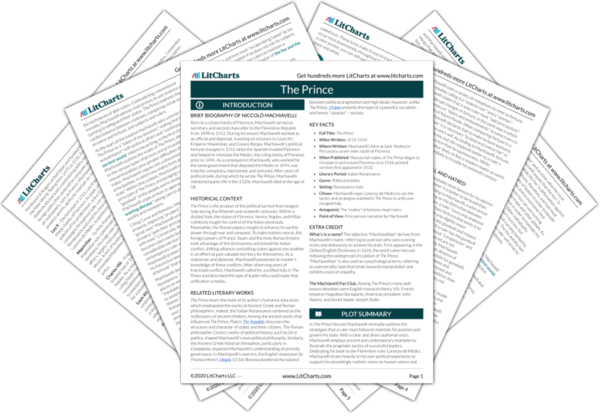Summary
Analysis
Machiavelli transitions to a discussion of auxiliaries, "the other kind of useless troops." Auxiliary troops are the foreign armies of a powerful ally who comes to the defense of another state. Although Machiavelli concedes that auxiliaries are sometimes "useful and reliable," their use typically spells "disaster" for the one who calls on them. If a prince uses auxiliaries and is defeated, then he is left defenseless. In the alternative situation, the auxiliaries are "victorious" and the prince is essentially under their control. Machiavelli cites the modern example of Pope Julius II to illustrate the potential danger of auxiliary troops. Julius's decision to throw himself "into the hands of a foreigner" was "ill-considered." However, by chance Julius escaped disaster when his auxiliaries failed to conquer and yet the opposing armies retreated due to extenuating circumstances. Others, such as the Florentines, ruined themselves with the use of auxiliaries.
Like mercenaries, auxiliary troops are "useless" because they prioritize their own self-interest before the interests of their princely employer. However, auxiliaries present a unique threat because they retain clear loyalty to a ruler other than their employer. Rulers who seek to defend their states with auxiliary arms will only undermine their own power and security. Machiavelli attributes Julius II's successful use of auxiliary troops to a stroke of luck and condemns his reliance on foreign arms. As Machiavelli stressed previously, rulers must avoid all actions that cede power to others. A prince who uses auxiliaries necessarily surrenders power to a foreign state.
Themes
Machiavelli argues that auxiliaries are even more dangerous than mercenary troops, since auxiliaries "constitute a united army, wholly obedient to the orders of someone else." Auxiliaries are "fatal," and therefore wise princes shun them and make use of their own forces. While cowardice is the gravest danger with mercenaries, valor is the danger with auxiliaries. According to Machiavelli, a prudent ruler would rather lose battles with his own troops "than win them with others," knowing that "no true victory is possible with alien arms."
Although auxiliaries are loyal, their loyalty is misdirected, since it binds these troops to their own prince instead of the ruler who hires them. Auxiliary troops are typically better organized than mercenaries, a fact which paradoxically renders auxiliaries even more ruinous than mercenaries. Even at the expense of losing battles, rulers should opt for their own arms over foreign troops.
Themes
Discussing Cesare Borgia, Machiavelli writes, "One can easily see the difference between these forces by considering the difference between the standing of the duke [Borgia]" when he used them. Borgia began his conquests with auxiliaries and then decided they were "unsafe," moving to mercenary troops. Having increased his power but finding these troops "disloyal," he decided to raise his own troops, achieving the greatest success in that way. He gained "real respect" only after becoming "absolute master of his armies."
As Borgia learned, citizen armies serve rulers more loyally than mercenary and auxiliary troops. Machiavelli urges princes to become self-reliant in matters of war and defense, stating that to secure and defend their states, princes must fight with their own arms. Additionally, he states that the use of native arms will increase a ruler's prestige, which further fortifies his position.
Themes
Citing the ancient examples of Hiero of Syracuse and David of the Old Testament, Machiavelli concludes, "Armor belonging to someone else either drops off you or weighs you down or is too tight." Returning to a contemporary example, Machiavelli argues that France, which uses a composite force of French troops and Swiss mercenaries, possesses an army that is "far inferior to a [purely] citizen army." While composite forces are superior to purely mercenary or auxiliary troops, this reliance on outside arms is "poisonous" and will plague the state like a wasting fever.
Using the metaphor of a wasting disease, Machiavelli describes the way in which a reliance on foreign arms steadily erodes a prince's power and security. Rulers must avoid the temptation of foreign arms and instead rely only on their own armies, regardless of whether their troops' abilities appear to be inferior to those of hired arms.
Themes
Get the entire The Prince LitChart as a printable PDF.

Machiavelli declares, "The prince who does not detect evils the moment they appear is lacking in true wisdom." Nonetheless, most rulers lack this crucial ability. Machiavelli ties the downfall of the Roman empire to its fateful decision to hire the Goths as mercenaries. Eventually, the Goths "inherited the prowess which the Romans lost." Machiavelli concludes, "Unless it commands its own arms no principality is secure; rather, it is dependent on fortune."
A ruler who relies on foreign arms for his defense places his fate in the hands of fortune. Because princes must depend on their own prowess rather than fortune, rulers should proactively raise and train their own armies. Wise princes will detect and avoid the risks of foreign troops, eventually inheriting the lost states and "prowess" of lesser rulers.
Themes












